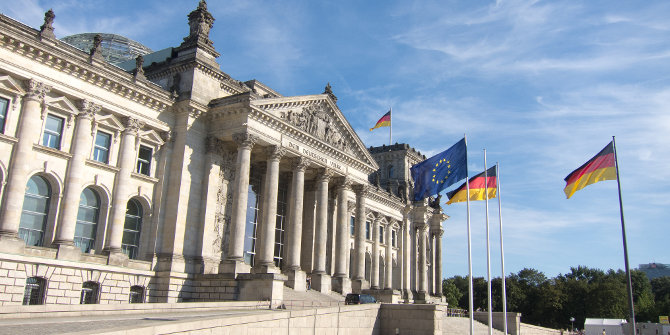 The left wing of British politics would benefit significantly from Brexit – even more than the right would do, says Richard Tuck (Harvard) in an edited extract from his recent lecture at Policy Exchange. Only outside the EU could Labour enact the radical socialist programme that has gained so much support. Jeremy Corbyn must hold his nerve and resist pressure to back a soft Brexit.
The left wing of British politics would benefit significantly from Brexit – even more than the right would do, says Richard Tuck (Harvard) in an edited extract from his recent lecture at Policy Exchange. Only outside the EU could Labour enact the radical socialist programme that has gained so much support. Jeremy Corbyn must hold his nerve and resist pressure to back a soft Brexit.
The Labour Party has virtually never won a general election purely on English votes; England is and almost always has been a fundamentally Tory country. So the prospect of a left wing party re-establishing itself in England depends on a continuation of the Union with Scotland, and, I argued, it was the EU which had undermined the British Union by offering the Scots a largely costless path to independence: almost everything which the Act of Union guaranteed to Scotland as an economy integrated with England was equally guaranteed to it by the European Union. The SNP realised this in the mid-1980s, and its dramatic change of policy on the Common Market (to which before then it had been deeply hostile) was the prelude to its electoral success. But Scottish independence was only costless in this fashion if both countries remained in the EU: even if an independent Scotland could remain in the EU after England had left, something the SNP leaders often fantasise about, the costs of disunion for the Scots would escalate dramatically, both economically and psychically. So Brexit is likely to stall the movement towards independence in Scotland.
The second reason that I think Brexit would help the Left is more fundamental. It was that the essential character of the EU, as Wolfgang Streeck has powerfully argued, is hostile to traditional socialism of the mid-20th-century variety. If Britain left the EU, the space available to left wing policies would suddenly expand, and all sorts of possibilities, including such things as thorough-going nationalisation or differential regional taxes, would be on the table again.

So I reasoned before the referendum; but I did not expect that I would see these effects so quickly. Jeremy Corbyn felt able to put forward a manifesto which not only endorsed leaving the EU (more clearly than some people are now claiming, since it promised an end to the free movement of labour, something incompatible with the Single Market, and the creation of new trade agreements with the rest of the world, which is incompatible with the Customs Union), but also included policies which would have seemed mainstream for the Labour Party during the thirty years after the second world war, but which would at the very least be hard to implement within the EU as currently configured. And it was these policies, or at least the attitude which underpinned them, which – it is generally agreed – produced a new kind of enthusiasm for the Labour Party.
In the months after the US election last November I often found myself arguing against people in America who thought that Trump and Brexit were the same phenomenon. On my view, Brexit was in fact an innoculation against Trump and the politics of the radical right. Leaving the EU would not only kill Scottish independence, it would also the kill the kind of right-wing politics in England which UKIP represented, since it was largely driven by a sense of powerlessness. As in the 1930s, Britain may have dodged the bullet of a kind of fascism, and largely because its political structures once again permit rather than constrain radical politics.
There is a widespread misunderstanding about the role immigration from the EU played in the referendum. The general right of EU citizens to come to Britain is a very clear example of powerlessness on the part of the British authorities. There are many other examples, as we shall see, which to a liberal on immigration like myself are more important, but it is perhaps the most visible and concrete case, and we have carefully and responsibly to distinguish between a general hostility to immigrants and the desire to have an immigration policy. It is, I believe, quite strictly parallel to the hostility to illegal immigration in the US; it is (at least to my mind) anxiety about its illegality, and the fact that certain kinds of liberals do not seem to care about this, which angers many people, since it too is an example of the ordinary political processes ceasing to have any effect.
However, the weeks after the general election have seen signs of a retreat from the clarity offered by the Brexit vote. Remainers, particularly of a familiar world-weary sort, say that this is because the clarity was an illusion, and the full implications of Brexit are only now dawning; but to think this is essentially to make the same mistake which British politicians, and to some degree the whole of British society, have always made about the character of the EU. It is to confuse what one might call policy with constitutional principle. The vote in the referendum was a vote on a constitutional issue, and questions of policy have now to be decided within this new framework – though the framework allows a very wide range of options.
The right way to theorise the EU, I argue, is as in effect a coordinated set of constitutional structures for each of the member countries. The EU is not a “superstate”, nor can it easily become one, juridically: it has always been clearly stated by the highest legal authorities in each country that at least at the moment the countries are sovereign entities, able in the last resort to decide their own futures. This is not empty rhetoric since, among other things, it is the justification for the continued representation of each EU country separately at the UN, something they are extremely unlikely ever to renounce. For this reason much of the use of the term “sovereignty” in the referendum debate was indeed as unhelpful as its critics complained.
Britain, by virtue of its desire to join what was then the Common Market, thus found itself forced unwittingly into the default shape of a modern state, with a constitution which lay beyond the power of the government to change. And as an almost instinctive recognition of this, the Wilson administration decided to use for the first time the default institution of constitutional legislation in a modern state, the referendum, in order to legitimate it.
Certain kinds of political programmes are simply impossible in certain kinds of constitutional orders. My favourite example is the creation of the National Health Service in Britain. It required a very unusual constitutional order, since its most distinctive feature, and the thing which still sharply differentiates it from the single payer systems found in most developed countries, was the fact that it involved a mass expropriation of private property, in the form of the so-called “voluntary” hospitals, some of which had been independent institutions for over 800 years. It is often asked by opponents of the NHS, “if it’s so good, why don’t other countries copy it?” But in this respect it would be extremely difficult for other countries to copy it, since in most modern states expropriation of private property without compensation would be legally impossible without a far-reaching constitutional amendment which might be very hard to pass. In Britain in 1946, all that was needed was a single sentence in an Act of Parliament. The achievements of the Attlee government, still the touchstone for left-wing measures in this country, required the kind of ancient omnicompetence which Parliament still possessed in the 1940s.
In the case of the EU, the overall character of the constitutional order pushes consistently in what we might call a neo-liberal direction. This is the point which Wolfgang Streeck has repeatedly insisted on, and has documented in convincing detail; he thinks that it is largely because of the influence on the institutions of German capital, and that is clearly true to an extent, but I would also argue that the institutions to some degree have a life of their own. Put in place a constitutional order which specifies certain economic freedoms – for the EU, the now notorious four freedoms, the free movement of goods, capital, services and labour, to which we should also add the lesser-known but very important freedom of establishment; let a group of modern jurists loose on them; and the result will almost inevitably be a series of rules which are tilted towards the market. Constitutional orders are a combination of rules and the people interpreting them (as Hobbes in particular understood very well), and the people inevitably develop a certain kind of internal culture which is usually proudly immune to outside political pressures. The American founders realised this, and were very interested in ways in which the judicial process could be made responsive to the citizens, including in some states the election of judges, and the elaborate process of nomination and confirmation for federal judges. The worst of all worlds is to have a strong constitutional order and an independent judiciary – something I sometimes fear Britain is drifting towards even outside the EU.
A simple way of seeing how this works is a comparison between Bernie Sanders and Jeremy Corbyn. As many people have observed, the parallels between them are very close: their age, their lack of conventional politicians’ gloss, their roles as insurgents within an established centre-left party, and the enthusiastic support they receive from young voters. The three proposals which Sanders put at the heart of his movement were: pull out of or radically modify NAFTA and do not enter the TPP; greatly increase the tax on the big Wall Street banks; and introduce free state college and university tuition paid for largely by the Wall Street tax. The British version of these proposals obvious resonate with Labour’s newly energised electorate, but – and I want to stress this – none of them would have been feasible for a British government within the EU.
The EU was itself Britain’s NAFTA or TPP, and it also decided all questions of trade for Britain with the rest of the world, so there would be no question of a British Bernie within the EU even thinking of such a thing. A British government could theoretically change the tax regime on the City, but the free movement of labour and capital within the EU would permit the banks simply to transfer operation to a friendlier tax regime elsewhere in the Union without anything of the trauma which would afflict Wall Street banks if they fled the US to avoid a Bernie tax. And even something (one would have thought) as parochial as free college tuition would not have been entered into lightly by a Britain within the EU. The EU enforces the principle that no distinction can be made between home and EU students when it comes to college fees, so free tuition funded by British taxes for British students (assuming that the banks could be made to stand still long enough to be taxed) would mean free tuition for students from across the EU funded by the British. Scotland has managed this on a small scale, though with the significant anomaly that it can charge fees to English students but not to other EU ones, but it is inconceivable that a scheme of this kind could be put in place for the whole of Britain without enormous public protest.
I am amazed that the tabloids didn’t leap long ago on to the fact that British taxpayers already subsidise EU students in English universities, far more in practice than other EU taxpayers subsidise British students at Continental universities.
The worst mistake which the Left in Britain could make would be to once again put itself under these kinds of constraint. Paradoxically, the constraints do not affect the Right anything like as much; indeed, I would say that the underlying verities of the EU are currently just the same as they were in the 1970s, when Margaret Thatcher wore her famous Common Market dress, and a wide swathe of Labour politicians, from Michael Foot through Tony Benn (who in those days was not thought to be exceptionally left-wing) to Peter Shore, who was generally on the right of the party, all saw the risks to traditional Labour politics which European union posed. This is why Corbyn, a relic (like myself) from the 1970s, could see this more clearly than other contemporary politicians.
This particular penny is beginning to drop on the Right – I was very struck by a recent piece in the Telegraph by Charles Moore raising the question of whether it might be best to stay within the institutions of the EU in order to block Corbyn’s policies. To his credit, he answered his question decisively in the negative, but his article reminds us about the odd history of European union, and how its critical aspect has always been the role of union in removing possibilities from domestic politics, though this has seldom been possible for the political parties to admit, even to themselves.
The Tories were enthusiastic about it as a means of permanently blocking the reappearance of socialism, but turned against it when it looked under Jacques Delors as if it would instead entrench left-wing policies; Labour became interested in it at that point, but began to turn against it recently when it turned out that the actual decisions of the European institutions by and large go against the interests of European workers. It should also be said that there has always been a significant section of the Labour party which viewed membership as a kind of self-denying ordinance, preventing the party from veering back to the Left and therefore (they thought) endangering its electoral prospects – this is, I think, the honourable (though I would say misguided) source of the strange fascination it has held for some important figures in the party. But the key point about this history is that it is precisely the capacity of European union to take serious political issues off the domestic agenda that has been the fundamental reason both for supporting it and for opposing it.
So what should the Left now do? There has been a remarkable outburst in the press and at Westminster of people trying to engineer a “soft” Brexit. Astonishingly, the idea seems to have gained ground in some quarters that the Labour vote was a vote against Brexit; this is an idea that could only occur to people in the Left establishment who believe that in reality most Labour Party voters must be just like them, and for some reason were merely pretending to be in favour of Brexit last year. This is testimony to the extraordinary power of the conviction among most politically active people that to be on the Left simply entails support for the EU, and that sooner or later everyone will realise this; it is also testimony to the social gulf between the Left establishment and its traditional electorate.
In particular, something like membership of the EEA is creeping back onto the agenda. At the beginning of the referendum campaign, like many Brexiteers at that time, I was mildly in favour of the EEA option, but I have come to realise its dangers. First, from the point of view of keeping Scotland in the Union it is not really an improvement on the EU. Scotland would still not need the United Kingdom to have a United Economy with England, and the logic of that position would sooner or later work itself out; Norway after all manages to have an integrated economy with the rest of Scandinavia without being under Danish rule. This is presumably why Nicola Sturgeon seems reasonably happy with a soft Brexit.
Second, the arguments about the restrictions on Left policies which the EU institutions represent apply just as much to the EEA or EFTA. By now the laws in EEA and EFTA countries on such things as competition are thoroughly integrated into the EU legal framework, and are governed by ECJ judgements. As long as this is so, the EEA and EFTA will have broadly the same economic character as the EU. This has already been seen in Norway, where a collective agreement dating from the 1970s which granted the Norwegian dock labourers’ union the sole right to unload cargo was nullified by the Norwegian Supreme Court earlier this year on the grounds of its incompatibility with EU law by virtue of the freedom of establishment clause. And though some defenders of this “soft” Brexit talk about it as a temporary measure, if there is one safe generalisation in politics, it is that temporary arrangements usually become permanent.
If I am right in supposing that this new surge in left-wing politics is the result of Brexit, it would be suicidal to overturn it. We can see the dangers of doing so very clearly in the case of the working-class UKIP voters, particularly in the North, who felt it was now safe to return to Labour; but it is also dangerous indirectly and in the long term for the newly-energised younger voters of the South. They may to some degree support the EU, but their new energy is a product of Brexit, and not in the sense that it is merely a reaction to it. Like everyone else, they have sensed the opening-up of possibilities long denied to them, and even if they want the EU they surely do not want the return to power of the kind of politician the EU necessarily breeds.
The great prize awaiting the Left in Britain, and it is now almost within reach, is genuine Brexit followed by a Labour government. Then the Left can re-enact whatever it thinks is good in EU regulations about such things as the environment and working conditions, and whatever immigration policy it wishes, and at the same time free itself from the far-reaching restrictions which the EU imposes on traditional socialism.
The Labour Party is faced with a tremendous temptation: undermine the May government by joining with those in the Conservative Party who want a soft Brexit, and profit from the Conservatives’ consequent dissolution. But if the Labour Party chooses short-term success by re-entering (in some form) these structures, the logic of British politics over the last thirty years will simply repeat itself, and we will inevitably end up with permanent Tory rule in an England without Scotland, or some kind of Blairite regime, no doubt repackaged (barely) as “Macronist” – Macron being the perfect emblem of the conjunction of the EU and neo-liberal economic policies, and the consequent destruction of socialism.
Without Brexit the Labour Party will revert to its role of providing an alternative managerial class for late-stage capitalism, and the enthusiasm of its new-found supporters will wither away or find new and more troubling outlets. This is exactly what the Tory Remainers would like to see happen, and the Labour leadership ought not to fall into their trap. The Labour Party needs to keep its nerve.
This post represents the views of the author and not those of the Brexit blog, nor the LSE. It is an edited extract from a lecture delivered by Richard Tuck at Policy Exchange on 17 July 2017.
Richard Tuck is the Frank G Thomson Professor of Government at Harvard University.







“The general right of EU citizens to come to Britain is a very clear example of powerlessness on the part of the British authorities.”
Powerlessness? Did the British authorities enforce the obligations of EU citizens coming to the UK, namely:
(*) For stays of under three months: the only requirement for Union citizens is that they possess a valid identity document or passport. The host Member State may require the persons concerned to register their presence in the country.
(*) For stays of over three months: EU citizens and their family members — if not working — must have sufficient resources and sickness insurance to ensure that they do not become a burden on the social services of the host Member State during their stay. Union citizens do not need residence permits, although Member States may require them to register with the authorities. Family members of Union citizens who are not nationals of a Member State must apply for a residence permit, valid for the duration of their stay or a five-year period.
Or did the British authorities choose not to enforce these obligations, and therefor remain powerless with respect to migration from the EU.
This sort of delusional nonsense is how the extreme right-wing ideologues tipped the balance in the 2016 referendum by scooping up a minority of traditional Labour votes.
Certainly some of this left-wing vote was just a protest against Cameron/Osborne.
The post-Brexit UK will need to be much less regulated and a lighter tax environment (increased inequality) to recover from the losses from isolating our access to our richest closest European markets.
The Red-UKIP collusion in delivering this neocon vision is scary – the article says “The great prize awaiting the Left in Britain, and it is now almost within reach” just have faith in the extreme right to deliver Hard Brexit and a radical socialist agenda can be delivered somehow.
This utter stupidity in assuming Brexit will deliver a radical Labour victory ignores the political damage Labour will suffer from backing neocon economics.
Except that it might be a bit difficult to leave the EU institutions without some fairly significant economic damage. It’ll be quite hard to enact the agenda Corbyn proposes when there’s no money left.
Socialism has failed everywhere it’s been tried.
It is a sign that the left is in crisis when even the most populist left-wing movement in decades opposing the most campaign in decades can’t get even close to a majority (offering massive public spending increases while in deep deficit and economic instability and only moderate tax rises for the rich).
Maybe instead of a treating a hard left government as inevitable, you should question whether it will ever happen.
Because the EU is not the thing stopping a hard left agenda from being implemented, it has always been the British people and in a post-Brexit environment, thank God.
So it’s all about party self interest.
This article goes to show that you can be as good a scholar as you like but it doesn’t necessarily help you with your political judgement.
Is it just me, or does anyone else find this statement by the author really scary (relevant bits extracted from the 9th paragraph)..
“the creation of the National Health Service in Britain… involved a mass expropriation of private property, in the form of the so-called “voluntary” hospitals, some of which had been independent institutions for over 800 years…. In Britain in 1946, all that was needed was a single sentence in an Act of Parliament.”
This encapsulates one of the things that the hard left hates about the EU – that businesses and industries cannot be nationalised without compensation.
And as someone on the left myself, I agree with DM that this article is delusional nonsense from beginning to end.
Stopped reading at the point he dismissed England as a ‘Tory country’. Especially as it was Scotland that kept May in Downing Street, thanks to the ‘anyone but Sturgeon’ brigade.
I have waited many years for this moment. I see a chance for humanity to build a new world of peace and prosperity for all, an end to poverty, ignorance, and endless imperialist wars. Socialism, a global planned economy, is the only way we are to survive. Our children have a right to a future of being nurtured and allowed to develop their creative lives, not shackled to the demands of a corrupt economic system. The EU is a straight out capitalist organisation. No socialism that way. Our relationship with Europe will need to be with the workers of Europe, to create an economic block based on a full socialist program. I feel that here, in the UK, we have the opportunity to elect a Labour Government, led by the Corbyn team, which will be a step along this long and hard road toward a future worthy of this intelligent and resourcefull human race.
Well said David Spencer.
Brexit will lead to more extreme politics from both left and right. Some on the left see the opportunity to build a socialist workers’ state, some on the right the chance to create their wet dream laissez faire market nivarna. My guess is that the most likely outcome would be a more right wing country with extreme cuts to welfare and a form of work-fair forcing people to replace the eastern European migrants weeding fields and working night shifts in the chicken factory. I would prefer to see internationalism and a Labour movement working with others across the world to build a better, fairer world. For me some sort of Corbynista nationalist socialist state would be a scary prospect.
An excellent well argued and thoughtful piece! I was a reluctant remainer and still feel deeply ambivalent towards EU institutional framework that leans too much towards a big business agenda.
However, unlike the author I welcome the idea of a codified constitution if it was to entrench principles of economic and social justice as a guiding policy framework that future governments had to follow. Nevertheless, as he points out, there are also dangers to a strong constitution and judiciary – what he calls ‘the worst of all worlds”. I guess it is a question of balance and the flexible and adaptive nature of our present unwritten constitution has played too much to the benefit of elites. It is surely time to replace EU constitutional supremacy with a written constitution of our own.